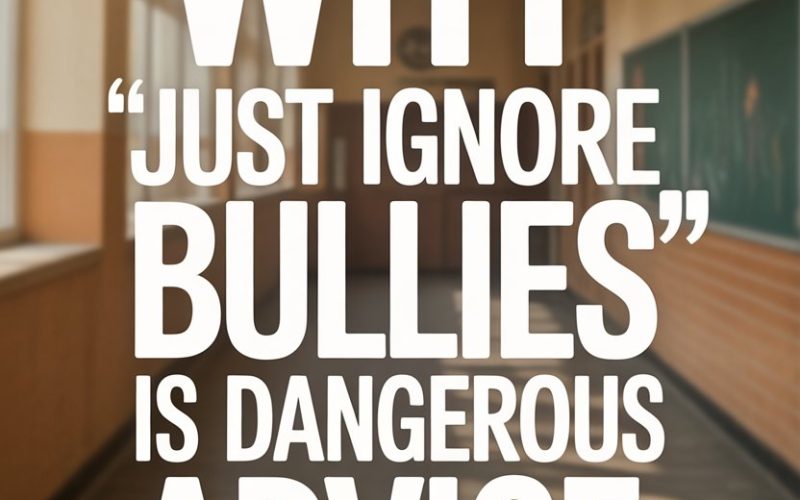Most parents, at some point, have blurted those three little words: “Just ignore bullies.” Maybe it slipped out over the breakfast table with a side of soggy cereal, or after a tearful school pickup.
It sounds so tidy—like a magic spell for childhood nastiness. If only it worked.
Turns out, it doesn’t. Not only is “just ignore it” unhelpful, but it can actually make things worse.
Here’s why this old chestnut of advice deserves to be gently retired—and what works better for our kids in the real world.
Why Kids Can’t “Just Ignore” Bullies
Imagine your boss started loudly mocking your clothes in the office kitchen, right as you microwaved your lunch. Would a shrug and a disinterested stare make the humiliation vanish? Nope.
Children are the same, just smaller and often stickier.
Research from leading child psychologists, including studies shared by the American Psychological Association, shows that ignoring bullying typically doesn’t stop the behaviour.
In fact, it signals to the bully that their target isn’t going to stand up for themselves, making them an even easier mark.
Kids crave peer acceptance and a sense of belonging. When they’re told to ignore hurtful behaviour, it can leave them feeling powerless and isolated.
The message, albeit unintentionally, becomes: “Your pain is not worth my attention.” That’s a gut punch no child needs.
The Escalation Problem
Bullies thrive on reactions, true. But a non-reaction isn’t the same as setting a boundary. Many bullies see silence as permission to keep going—or up the ante.
Think of it as a game of emotional whack-a-mole. Ignoring the first whack doesn’t mean the mallet goes away. Instead, it often comes swinging harder, and with more audience members.
Kids who ignore bullies may end up being targeted more frequently and with greater intensity, as found in research from the Journal of School Violence.
The Mental Health Toll
Children are resilient—up to a point. When bullying goes unaddressed, anxiety, depression, and a host of stress-related issues can creep in.
One major study from the National Institutes of Health linked ongoing bullying with increased risk of depression years later.
When adults suggest “just ignore it,” children may begin to believe that speaking up about mistreatment will only be met with more indifference.
They may stop telling you about their problems altogether. That’s not independence—just quiet suffering.
Why “Just Ignore” Persists
It’s easy to see why this advice became a go-to. It sounds empowering (“You don’t have to care what they think!”), and it feels practical for parents with a million things on their plate.
Also, it spares us from the dreadful possibility that our child might have to face something we can’t fix instantly.
But this approach was built for a world where playground squabbles ended with a game of tag, not viral videos or relentless group chats. Social dynamics have shifted—and our support needs to catch up.
Positive Alternatives That Actually Help
Ditching “just ignore it” doesn’t mean encouraging a full-on lunchroom showdown. Far from it. Parents can equip their kids with practical skills that build resilience and set boundaries.
Teach Assertive Communication
Many children have never been coached on how to look a bully in the eye and deliver a firm, confident “That’s not okay” or “Leave me alone.” Role-play at home. Use silly voices if you must. The point is to help your child practice using their voice rather than silencing it.
Help Kids Find Their Allies
There’s power in numbers. Support your child in building friendships and finding the kids who make them feel safe. Sometimes, the presence of just one buddy is enough to scare off a tormentor.
Many schools have buddy benches or peer support schemes—encourage your child to use them.
Encourage Reporting—Without Shame
Children often worry that telling an adult will make things worse, or that they’ll be labelled a snitch. Make it clear that seeking help is a sign of strength, not weakness.
Be prepared to support your child through the process. Schools are learning how to respond to bullying, but they need to know it’s happening first.
Model Healthy Boundaries
Children learn most from what we do, not what we say. If you’re able, talk openly about times you’ve stood up to unkindness—or wished you had. Share how you handled it, or how you’d handle it differently now.
Let your kids see that adults don’t always “just ignore” things either.
Coach Cyber Skills for Digital Bullies
Today’s bullies don’t clock off at 3:30. Unkind messages can ping through phones and apps at all hours. Show your child how to block, mute, and report abusive users.
Help them understand that being online doesn’t mean they’re on their own. The Child Mind Institute has practical guides for parents on supporting kids through digital harassment.
The Danger of Silence
Ignoring bullying can feed a toxic silence.
Children may feel ashamed or believe they’re somehow at fault. Some even start to think they deserve the treatment, which can follow them into adulthood—like an unwelcome houseguest who refuses to leave.
Bullying isn’t just a rite of passage. It’s a form of aggression that can leave scars, inside and out. By telling children to ignore it, parents risk becoming bystanders themselves.
What to Say Instead
Next time your child comes to you with those heartbreaking words—“They’re being mean”—try these responses:
- “Thank you for telling me. That was brave.”
- “Tell me exactly what happened—not just the words, but how it made you feel.”
- “What do you wish you could say to them?”
- “Let’s think together about what you can do next time. I’ll help you practice.”
- “Would you like me to tell your teacher with you, or would you like to try first?”
It’s not about taking over. The goal is to help your child feel heard, respected, and supported, while giving them the tools to stand up for themselves safely.
When You Need Outside Help
If bullying persists, or if you spot signs of distress (changes in mood, sleep, appetite, or withdrawal from things they once loved), reach out.
This could mean contacting the school, a counsellor, or even local authorities if you suspect things have crossed into harassment or violence. There’s no shame in asking for backup.
What Kids Remember
Long after the schoolyard dramas fade, children remember how the adults in their lives responded.
Did someone listen? Did someone care enough to act? Or were they left to muddle through on their own?
Let’s retire “just ignore bullies” and hand our kids real tools—and the comfort of knowing we’re in their corner, even when the playground politics get messy.
No magic spell required. Just a parent who’s willing to listen, help, and occasionally practice their best “leave me alone” face in the bathroom mirror. For solidarity’s sake.




